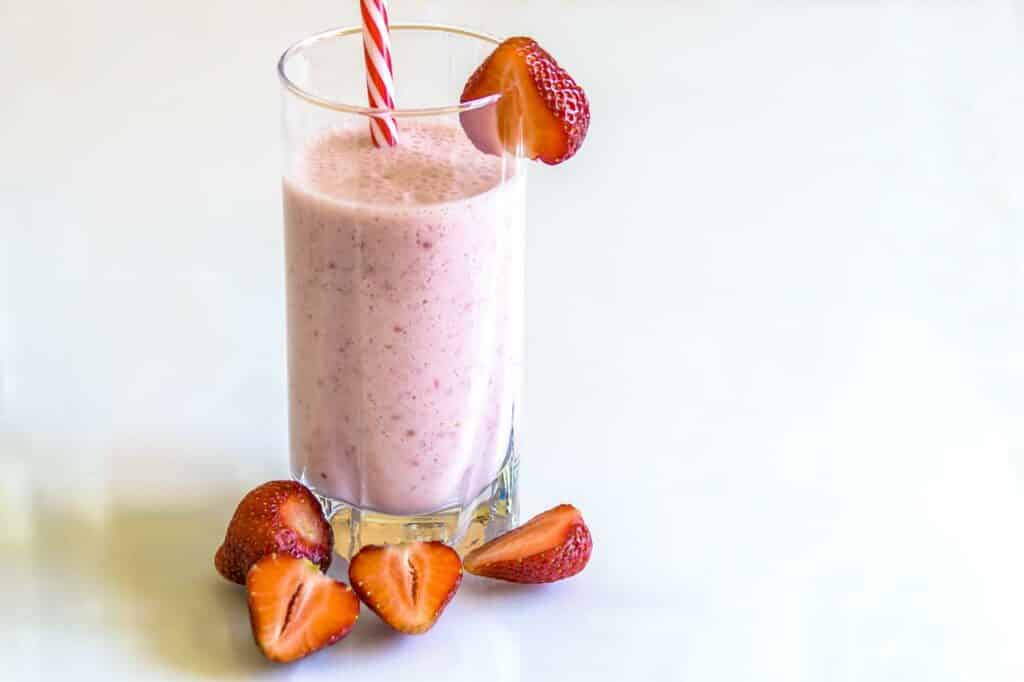Kefir is a fantastic beverage that packs more probiotics than yogurt.
It’s also popularly known for its versatility in the culinary world.
Its sourness makes it an excellent choice for salad dressings and marinades.
While we may benefit from this healthy drink, we might wonder if the same applies to our fidos.
Well, let’s find out, shall we?
So, can dogs drink kefir?
Yes.
Dogs can drink kefir in moderation as it’s an excellent source of gut-boosting probiotics, vitamins, and minerals.
For lactose intolerant dogs, kefir is a perfect alternative as their system can handle it better than regular milk.
This article will explain what kefir is.
It will also discuss the benefits of your pup drinking kefir.

What is kefir?
Kefir is a drink made by adding bacteria and yeast cultures to the milk of a cow, goat, or sheep.
It can also be made from non-dairy alternatives such as coconut, rice, and soy milk.
The fermentation process involves the bacteria producing carbon dioxide and breaking down lactose in the milk into lactic acid, which takes about 12 – 24 hours.
Once done, the mixture turns to kefir, a drink similar to yogurt but thinner in consistency.
Kefir is especially beneficial to humans and hounds alike that are lactose intolerant.
Is kefir safe for dogs?
Yes.
Kefir is safe for dogs to drink as it’s rich in natural probiotics that benefit them.
These probiotics are essential as they help alleviate the symptoms of gastrointestinal tract discomfort in dogs—however, it’s essential to consider your fido’s overall diet and health needs.
While kefir is safe for dogs to consume, it’s important to consult your vet before adding it to your pup’s diet.
Your vet will be better positioned to guide you on the dosage depending on your dog’s size, weight, age, and overall health.

How to feed your dog kefir
When offered in moderation, kefir can benefit your fido’s life as it’s loaded with probiotics that help monitor a healthy gut.
However, your dog may experience stomach upset when first introduced as it might be too much for their system.
When serving kefir to your dog, you need to remember some important tips.
They include:
- Introduce kefir slowly into your dog’s diet to avoid nausea or diarrhea while allowing his system to adjust
- Start with ¼ or ½ a teaspoon daily while checking for any reactions. If your dog tolerates this amount, you can increase the amount to one or two teaspoons per 16 pounds
- You can offer a small serving on its own as a treat, or you can add it to your dog’s regular meal
- In case of illness, you can give your dog one or two teaspoons of kefir a few hours after taking his medication for an extra probiotic boost
- Always choose the unsweetened and unflavored variety for your dog
- For daily dosage, give one teaspoon to small-sized dogs, 1 – 2 teaspoons to medium-sized dogs, and 2 – 3 teaspoons to larger dogs
Health benefits of kefir to dogs
As with humans, the probiotics found in kefir are essential for several reasons.
These may include:
- Treating digestive issues
If your dog has been on antibiotics or had a recent bout of diarrhea, the probiotics in kefir can help get his system back on track.
Antibiotics and diarrhea can disrupt the balance of the good bacteria in your dog’s gut, causing severe digestive problems.
Kefir aids in restoring the balance in your dog’s gut while also counteracting the effects of destructive yeast in the body.
- Immunity
The probiotics in kefir play a great role in increasing immunity, especially in older dogs and puppies.
If your dog regularly drinks kefir, he may be protected against infection as the probiotics prevent harmful bacteria like salmonella and E.
Coli from surviving or thriving in your pup’s gut.
- Rich in potassium
Coconut kefir is a non-dairy alternative packed with potassium, promoting healthy bones in dogs.
Potassium also aids the functioning of electrical charges in the heart, nerves, and muscles.
- Excellent source of vitamins and other minerals
Kefir is chock-full of valuable minerals and vitamins, such as Vitamins A, B-complex, D, and K.
It also contains calcium, phosphorus, and magnesium, which help fight allergies and improve your pup’s kidney and liver function.
Other health benefits of kefir include:
- Antibiotic and anti-fungal properties
- Promotes healthy skin
- It helps with heartburn, gas, irritable bowel, and upset stomach
- Prevents bad breath
- Helps with pancreatitis, joint disease, anemia, and leaky gut syndrome
- It helps reduce the multiplication of cancerous cells
- Helps with malaise4, depression, and anxiety
How do I make homemade kefir for my dog?
Making kefir at home, even as a beginner, can be easy, as it doesn’t require too many ingredients or fancy equipment.
You’ll need:
- Two glass jars
- Coffee filters or cheesecloth and a rubber band
- Milk (dairy or plant-based)
- Plastic or metal strainer
- Kefir grains
Add one cup of milk and one tablespoon of kefir grains to a glass jar and leave about an inch of space at the top.
Cover the jar with cheesecloth or coffee filters and secure it tightly with the rubber band.
Allow the mixture to sit for 24 hours or until the liquid ferments and ribbons of white and yellow start to form.
Strain the kefir using a metal or plastic strainer in another glass jar and seal it.
Store it in the fridge.
The kefir can last up to three weeks.
Is kefir toxic to dogs?
While kefir can be a natural way to offer your dog probiotic supplements, it’s not entirely safe either.
Although very low in lactose, milk kefir can still cause adverse reactions in some dogs as they have varying degrees of sensitivity.
If your dog drinks too much kefir regularly, he may experience diarrhea, bloating, watery stools, and other digestive issues.
Some store-bought kefir may also contain added sugar and artificial flavoring like xylitol which can be highly toxic to dogs even in small amounts.
If your dog becomes ill or behaves unusually after drinking kefir, contact your vet immediately.
In summary
Kefir in small doses regularly can help keep your dog’s health in tip-top shape.
However, it’s best to consult your vet before introducing new foods or drinks to your dog’s diet, including kefir, as they have different digestive systems than ours.
- What Dog Breeds Have Pink Skin? - March 24, 2023
- What Are the Most Inspiring Dog Breeding Quotes? - March 20, 2023
- Can Pheromone Spray Help Improve Dog Breeding Results? - March 19, 2023








